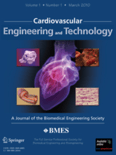
Cardiovascular Engineering and Technology
Scope & Guideline
Bridging Engineering and Heart Care
Introduction
Aims and Scopes
- Cardiovascular Biomechanics:
Research on the mechanical behavior of cardiovascular tissues and devices, including studies on blood flow dynamics, tissue mechanics, and the interaction of engineered materials with biological systems. - Computational Modeling and Simulation:
Utilization of computational techniques such as finite element analysis and computational fluid dynamics to model cardiovascular phenomena and predict clinical outcomes. - Innovative Medical Devices:
Development and testing of novel cardiovascular devices, including stents, valves, and assist devices, focusing on their design, functionality, and patient-specific applications. - Clinical Applications and Translational Research:
Studies that bridge laboratory findings with clinical practice, emphasizing the relevance of engineering solutions in real-world cardiovascular medicine. - Machine Learning and Data Analytics:
Application of machine learning techniques to analyze cardiovascular data, improve diagnostic accuracy, and enhance treatment strategies. - Imaging and Diagnostic Techniques:
Advancements in imaging modalities for cardiovascular assessment, including MRI, CT, and ultrasound, along with their integration into clinical workflows.
Trending and Emerging
- Patient-Specific Modeling:
There is an increasing focus on creating personalized models that account for individual anatomical variations, which enhances the accuracy of simulations and therapeutic interventions. - Integration of Artificial Intelligence:
The use of AI and machine learning to analyze cardiovascular data is on the rise, facilitating improved diagnostics, treatment planning, and predictive modeling. - Biomaterials and Tissue Engineering:
Research on advanced biomaterials and tissue-engineered constructs for cardiovascular applications is growing, particularly in the context of regenerative medicine. - Wearable Technology and Remote Monitoring:
The development and validation of wearable devices for continuous monitoring of cardiovascular health are trending, reflecting a shift towards proactive patient management. - Minimally Invasive Techniques and Devices:
There is a notable increase in studies related to minimally invasive procedures and devices, emphasizing their benefits in reducing recovery times and improving patient outcomes.
Declining or Waning
- Traditional Surgical Techniques:
Research related to conventional surgical methods is becoming less frequent as advancements in minimally invasive and robotic-assisted techniques gain traction. - General Physiological Studies:
Broad studies on cardiovascular physiology without a specific engineering application are decreasing, as there is a stronger emphasis on targeted research that combines engineering with clinical implications. - Basic Hemodynamic Studies:
Basic studies focused solely on hemodynamics without the integration of computational modeling or device testing are becoming less common, reflecting a trend toward more applied research.
Similar Journals

JACC-Basic to Translational Science
Connecting Basic Research to Clinical ExcellenceJACC-Basic to Translational Science, published by Elsevier Science Inc, is a distinguished open access journal that has been advancing the field of cardiology and cardiovascular medicine since its inception in 2016. With an ISSN of 2452-302X and an impressive Q1 ranking in Cardiology and Cardiovascular Medicine as per the 2023 category quartiles, the journal is recognized for its commitment to publishing high-quality research that bridges the gap between basic science and clinical application. Operating from its base in the United States, JACC-Basic to Translational Science is at the forefront of enriching the academic community and healthcare professionals with cutting-edge studies and insights. The journal's robust reach is highlighted by its rank of #14 out of 387 in Scopus for its pertinent subject area, placing it in the 96th percentile. It aims to provide an open access platform that fosters collaboration and the exchange of ideas to ensure the continuous advancement of cardiovascular research. Readers can easily access the latest findings and contribute to the ever-evolving landscape of cardiology through this esteemed publication.

CANADIAN JOURNAL OF CARDIOLOGY
Empowering Cardiovascular Innovations Through Rigorous ResearchCanadian Journal of Cardiology (ISSN: 0828-282X, E-ISSN: 1916-7075), published by Elsevier Science Inc, serves as a vital platform for disseminating high-quality research in the dynamic field of cardiology and cardiovascular medicine. Since its inception in 1985, this journal has established itself as a leader in the field, currently holding a prestigious Q1 ranking in Cardiology, indicating its significant impact and contribution to medical science. With a Scopus rank of #50 out of 387 in its category and placing in the 87th percentile, the journal showcases rigorous peer-reviewed articles that advance knowledge and practice in cardiology. Although the journal is not open access, it provides valuable insights and research findings that cater to clinicians, researchers, and students who are committed to improving cardiovascular health. As we approach the convergence of years to 2024, the Canadian Journal of Cardiology continues to strive for excellence, facilitating a discourse vital for both academic and clinical advancements in cardiology.

Open Cardiovascular Medicine Journal
Advancing Cardiovascular Knowledge for a Healthier TomorrowOpen Cardiovascular Medicine Journal is a notable scholarly platform published by Bentham Science Publishers Ltd, dedicated to advancing knowledge in the field of cardiology and cardiovascular medicine. With an E-ISSN of 1874-1924, this open-access journal has been a beacon for researchers and clinicians alike since its inception in 2009. Acting as a conduit for the latest research findings, the journal fosters interdisciplinary collaboration and innovation, contributing to the overall progress in cardiovascular health. Although currently ranked in the 26th percentile among cardiology journals, it emphasizes high-quality, peer-reviewed articles that uphold the rigorous standards of academic integrity. The journal also benefits from a robust editorial team and an array of publication options, ensuring accessibility and visibility of crucial cardiovascular research. As it continues its journey through 2023 and beyond, Open Cardiovascular Medicine Journal remains essential for anyone invested in the challenges and advancements within the cardiovascular domain.
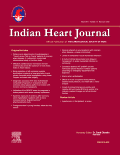
Indian Heart Journal
Pioneering Insights in Cardiovascular MedicineIndian Heart Journal, published by Elsevier, is a distinguished peer-reviewed journal dedicated to the field of cardiology and cardiovascular medicine. Founded in 1961, this journal has been a pivotal resource for researchers, healthcare professionals, and students, providing a platform for innovative studies and insights into heart health. The journal transitioned to an Open Access model in 2013, ensuring widespread dissemination of vital research findings to enhance global understanding of cardiovascular diseases. Ranked in the Q3 category for Cardiology and Cardiovascular Medicine in 2023, it holds a reputable position in the medical community, with a Scopus rank of #222 out of 387 journals in the same field, placing it in the 42nd percentile. The Indian Heart Journal strives to foster advances in clinical practice and research while addressing the unique cardiac health challenges faced in India and beyond.
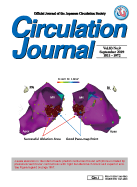
CIRCULATION JOURNAL
Shaping the Future of Cardiovascular Medicine Together.CIRCULATION JOURNAL, published by the Japanese Circulation Society, stands as a premier platform for cutting-edge research in the fields of Cardiology and Cardiovascular Medicine. With an impressive impact factor placing it in the Q1 quartile for both cardiology and general medicine, this journal is essential for researchers and practitioners seeking to stay at the forefront of cardiovascular science. The journal's accessible open access options ensure that groundbreaking studies are widely disseminated, reflecting its commitment to advancing medical knowledge and improving patient care. Since its inception in 1996, CIRCULATION JOURNAL has fostered a global dialogue on vital cardiovascular issues, making it a vital resource for academics, healthcare professionals, and students alike. With its base in Tokyo, Japan, the journal not only highlights regional advancements but also contributes significantly to the global medical community.
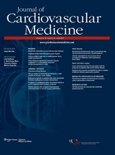
Journal of Cardiovascular Medicine
Elevating Standards in Cardiovascular MedicineWelcome to the Journal of Cardiovascular Medicine, a leading platform for the dissemination of high-quality research in the field of cardiology and cardiovascular medicine. Published by Lippincott Williams & Wilkins, this esteemed journal boasts an ISSN of 1558-2027 and an E-ISSN of 1558-2035, reflecting its commitment to accessible and innovative cardiovascular research. With a significant impact factor and ranked Q2 in both Cardiology and Cardiovascular Medicine as well as in Medicine (Miscellaneous) for 2023, the journal is recognized for its contributions to advancing knowledge and practice in this critical area of health. The journal disseminates original research, reviews, and clinical studies, aimed at clinicians, researchers, and healthcare professionals who are dedicated to improving cardiovascular health outcomes. With a continuous commitment to evolving research from 2006 to 2024, the journal is an essential resource for those looking to stay at the forefront of the latest discoveries and methodologies in cardiovascular medicine.
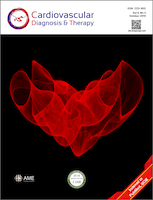
Cardiovascular Diagnosis and Therapy
Pioneering Insights in Cardiology and TherapeuticsCardiovascular Diagnosis and Therapy, an esteemed journal in the field of Cardiology and Cardiovascular Medicine, is published by AME PUBLISHING COMPANY, based in Hong Kong, China. With an ISSN of 2223-3652 and an E-ISSN of 2223-3660, this open-access journal aims to present cutting-edge research that significantly advances diagnostic and therapeutic practices in cardiovascular health. Recognized for its impact, it holds a 2023 category quartile ranking of Q2 and is positioned at rank #124 out of 387 in Scopus, reflecting its noteworthy contribution to medical literature with a percentile of 68th. The journal welcomes contributions that span various aspects of cardiovascular research, including clinical trials, epidemiological studies, and innovative therapeutic approaches, making it a vital resource for researchers, practitioners, and students alike, committed to improving cardiovascular care.

Cardiovascular Digital Health Journal
Innovating Heart Health: Where Digital Meets MedicineCardiovascular Digital Health Journal is a premier publication dedicated to advancing the field of digital health technologies in cardiovascular care. Published by Elsevier, this journal is a vital resource for researchers, professionals, and students engaged in the exciting intersection of cardiovascular medicine and innovative digital solutions. With an ISSN of 2666-6936, the journal spans from 2020 to 2024 and is categorized in Q2 across prominent fields including Biomedical Engineering, Cardiology and Cardiovascular Medicine, and Critical Care and Intensive Care Medicine, reflecting its influential position in the academic community. Although currently not an open-access journal, it offers access through institutional subscriptions, enabling a broad reach for cutting-edge research. The Cardiovascular Digital Health Journal not only strives to disseminate high-quality studies but also aims to foster collaborative insights that propel the integration of digital health in cardiovascular practice, addressing the critical needs of health systems worldwide.
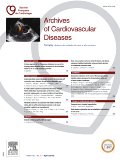
Archives of Cardiovascular Diseases
Exploring the depths of cardiovascular medicine for global impact.The Archives of Cardiovascular Diseases, published by Elsevier Masson, stands as a leading journal in the field of cardiology and cardiovascular medicine, with an impressive impact factor that underscores its relevance and influence. This esteemed journal, recognized in the Q2 category for both cardiology and miscellaneous medicine, aims to disseminate groundbreaking research, innovative methodologies, and clinical advancements that can shape the future of cardiovascular health. With its diverse array of open access options, researchers and students alike have the ability to engage with high-quality content, ensuring that cutting-edge findings are accessible globally. Since its inception in 2008, the journal has actively contributed to the advancement of knowledge in cardiovascular diseases, fostering collaboration among clinicians, researchers, and educators. Headquartered in Paris, France, Archives of Cardiovascular Diseases remains committed to enhancing our understanding of cardiovascular health and improving patient outcomes worldwide.

International Cardiovascular Research Journal
Exploring the frontiers of cardiology and cardiovascular health.International Cardiovascular Research Journal, published by Shiraz University Medical Sciences, serves as a vital platform for the dissemination of cutting-edge research in the field of cardiology and cardiovascular medicine. Since its inception in 2011, this journal has continuously devoted itself to promoting the highest quality of scholarly communication, helping to bridge the gap between laboratory findings and clinical application. With an ISSN of 2251-9130 and an E-ISSN of 2251-9149, it is indexed in prominent databases, contributing to its visibility and accessibility to a global audience. Although currently classified in the Q4 quartile in the 2023 rankings, the journal is committed to enhancing its impact factor and academic stature. It aims to facilitate open access for all published articles, although specific details on access options are pending. Through its rigorous peer-review process and diverse scope—which encapsulates advancements, clinical studies, and innovative therapeutic strategies—this journal fosters academic collaboration in the realm of cardiovascular health, making it an invaluable resource for researchers, practitioners, and students alike.